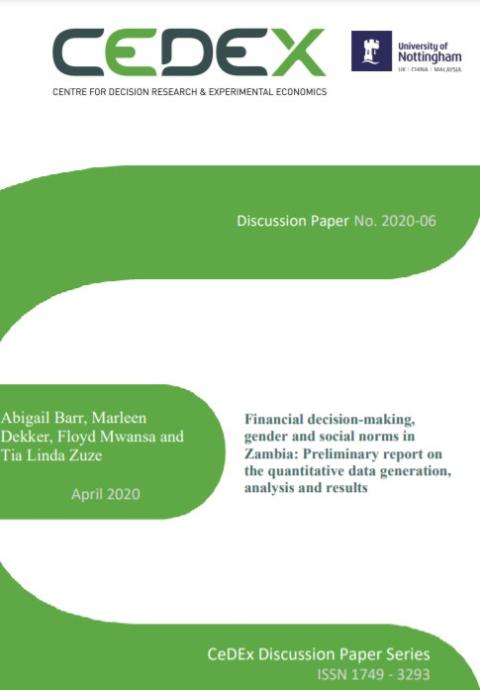- Briefing paper
- 2 February 2021
CeDEx 2020-06: Financial decision-making, gender and social norms in Zambia: Preliminary report on the quantitative data generation, analysis and results
- Author: Abigail Barr, Marleen Dekker, Floyd Mwansa, Tia Linda Zuze
- Published by: University of Nottingham

This document presents the preliminary findings from the quantitative data generation and analysis conducted as part of the project “Financial decision-making, gender and social norms in Zambia”.
Using a series of specially designed behavioural experiments, the report generates an extensive set of insights into the normative environment within which spouses in Eastern Province, Zambia, make decisions about individual money holding and saving.
Here are some of those insights:
Spouses in Eastern Province, Zambia, are willing to compromise household-level earnings in order to maintain individual control over money.
Wives, but not husbands, are more likely to compromise household-level earnings in order to maintain individual control over money, when they can keep that money and their actions hidden from their spouses.
Individually-held behavioural prescriptions, i.e., the “shoulds” and “oughts” that individuals have in mind and reference as guides for their own behaviour and as benchmarks against which to evaluate others’ behaviour, inform decision-making about maintaining individual control over money at a cost to the household.
Further, when individuals know that their spouses will find out about their descisions regarding maintaining individual control over money (or not) at a cost to the household, the individuals take their spouses’ opinions about what they should do into account, i.e., they compromise.
There is strong but not unequivocal evidence pointing to the existence of a social norm, i.e., a “should” or “ought” that is collectively held and enforced by members of a community, forbidding saving in secret from one’s spouse, with the secrecy not the saving being the problem. Assuming it exists, this social norm forbidding saving in secret from one’s spouse applies to both husbands and wives, and this is acknowledged by both husbands and wives. However, the extent to which violations of this norm are tolerated depends on who is doing the violating and who the evaluating.
In patrilineal communities (as compared to matrilineal communities), both husbands and wives are especially intolerant of secret saving by husbands and in both patrilineal and matrilineal communities, wives are less tolerant than husbands of secret saving by husbands and more tolerant than husbands of secret saving by wives. This relative tolerance of secret saving by wives notwithstanding, just under one in three wives and one in six husbands think that a man is justified in beating his wife if he discovers that she is saving in an e-wallet or has joined a savings group without his knowledge and, as grounds for wife beating, saving in secret is on a par with neglecting the children, visiting friends or family in secret and refusing to have sex.
- Countries / Regions:
- Zambia
Related resources
Report
26 March 2025

Report
20 March 2025

Report
20 March 2025
